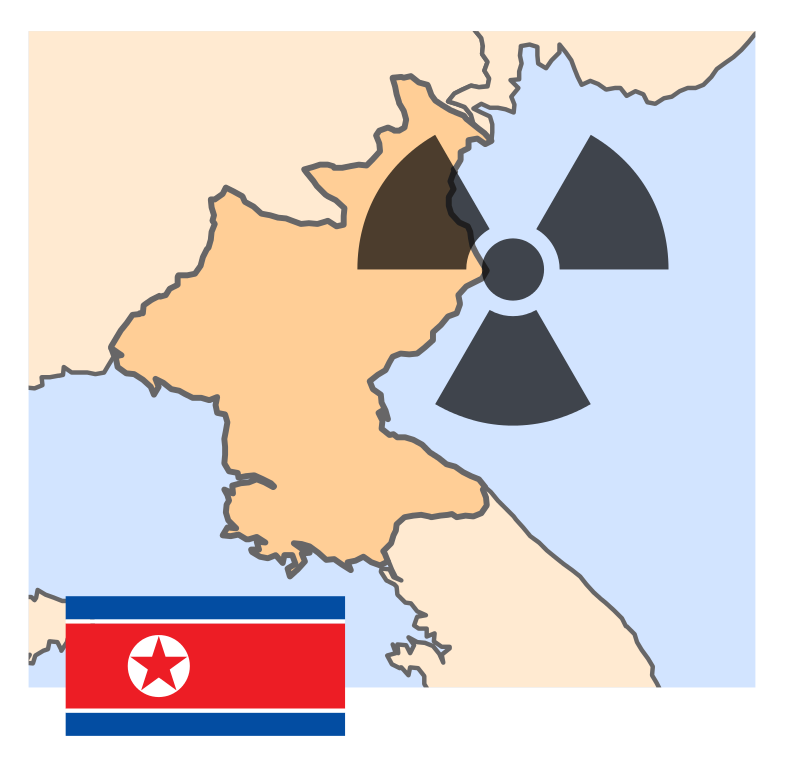by Dr. Alon Levkowitz
Is North Korea simply an international relations anomaly, or is there another explanation?

Nuclear North Korea, image via Wikipedia
BESA Center Perspectives Paper No. 551, August 4, 2017
EXECUTIVE SUMMARY: Will new economic sanctions against North Korea convince it to give up its nuclear and missile capabilities? No, they won’t. The US and its allies must evaluate whether the goals of new sanctions are feasible, how effective they can be, and whether they will be fully implemented. Without analyzing these parameters, new sanctions will be just more diplomatic kabuki that fails to change North Korean policy.
Students of international relations and international political economy study the effectiveness of economic sanctions on state policies. They learn how economic sanctions can force regimes to change policy, as occurred in South Africa, Libya, and even Iran in the case of the nuclear agreement.
The logic of economic sanctions is very simple. The high cost of sanctions on a state will convince its regime to change policy, as the price tag of maintaining its policy is too high. In some cases, the cost of sanctions might be increased to convince a regime to hasten a change in policy.
While in the South African, Libyan, and Iranian cases, sanctions did lead to a decline in the states’ GDPs and subsequent policy changes, in the North Korean case, Pyongyang has not changed its nuclear and missile policies. According to new data, the North Korean economy has in fact developed over the past few months despite international economic sanctions.
Is North Korea simply an international relations anomaly, or is there another explanation? The answer requires analysis of the sanctions’ goals, their effectiveness, and their implementation.
Goals of sanctions
States that are contemplating the imposition of sanctions on North Korea either bilaterally (as Washington does) on officials and companies that trade from or with North Korea, or multilaterally through the UNSC, must ask themselves what goals they want to achieve and whether those goals are realistic.
Throughout the years, the sanctions posed multilaterally by the UNSC and bilaterally by the US, the EU, and other states have been intended to convince the North Korean regime to abort its nuclear and missile program. Sanctions were imposed after North Korea held nuclear and missile tests, but the goal of convincing Pyongyang to abandon these programs was not achieved.
The critical issue is whether or not Pyongyang has any incentive to stop developing its nuclear and missile programs. If it does not, then sanctions will never convince it to change its policy.
The ballistic missile test on July 28, 2017 demonstrated Pyongyang’s willingness to achieve the development of a deterrent force even in the face of possible new sanctions. When state leaders suggest that sanctions on North Korea will convince Pyongyang to give up its nuclear and missile program, they are succumbing either to wishful thinking or false assumptions about North Korea.
Effectiveness and implementation
One of the main reasons why sanctions on North Korea have been ineffective was their selective implementation, especially by the Chinese. China was not the only state to fail to fully implement UNSC sanctions, but its influence on the North Korean economy is particularly vital to Pyongyang’s interests. If sanctions are not fully implemented, their effectiveness naturally declines.
Another obstacle is the ease with which some sanctions can be bypassed, especially those that pinpoint companies and officials who deal with North Korea’s nuclear and missile industry. Over the years, Washington has imposed sanctions on companies and people in North Korea and even on Chinese companies that traded with the DPRK. But the Iranian case study teaches us that such sanctions are easily skirted.
In many cases, Iranian companies were able to bypass sanctions by changing their names or working with new middlemen. North Korea uses the same tactics with the help of Chinese middlemen whom it pays for the service.
What are the goals of new sanctions, and are they feasible? If the goal is to convince the DPRK to give up its nuclear or missile programs, it is probably not feasible. Pyongyang will continue to test its ICBM in order to improve its accuracy to the point that it can reach the US West Coast, a capability it appears to have achieved as of its missile test of several days ago.
Whether or not Washington wishes to declare North Korea an “official” nuclear state, it has obtained nuclear capabilities. Soon it will obtain the capability to launch a nuclear missile. It will become more difficult to constrain it through sanctions, particularly as long as China and Russia fail to implement them.
We must accept the idea that sanctions will not convince the DPRK to give up its nuclear and missile capabilities.
View PDF
BESA Center Perspectives Papers are published through the generosity of the Greg Rosshandler Family
Dr. Alon Levkowitz, a research associate at the Begin-Sadat Center for Strategic Studies, is an expert on East Asian security, the Korean Peninsula, and Asian international organizations.
Source: https://besacenter.org/perspectives-papers/north-korea-sanctions/
Follow Middle East and Terrorism on Twitter
Copyright - Original materials copyright (c) by the authors.
No comments:
Post a Comment